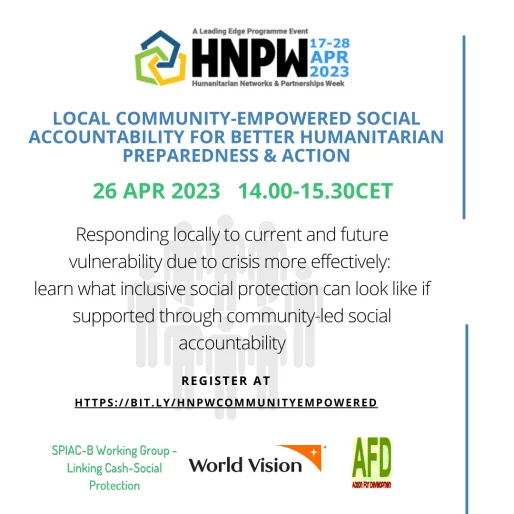“Local Community-Empowered Social Accountability for better Humanitarian Preparedness & Action”
Hybrid Webinar Session on “Local Community-Empowered Social Accountability for better Humanitarian Preparedness & Action” as part of Humanitarian Networks & Partnership Week (HNPW) 2023.
Date: 26 April, 2-3:30 pm CET.
While, by 2022, 1.3 bn are reached via cash transfers (763 Mio people via digital transfers) in humanitarian and Government social assistance transfers) (1) and complementary service provision for most vulnerable populations, for more effective leverage of humanitarian & social protection cash assistance, with scaled up cash, voucher transfers in response to and post COVID-19 pandemic, (2) cost of living, conflict and climate change induced disaster impact, there is still continuous need to enhance humanitarian and social protection linkages and underpinning humanitarian and social accountability to ensure effective access, awareness, quality of service provision according to policy commitments, as 2 out of 3 children have no access to any form of child or family benefit, and coverage is lowest where child poverty and vulnerability in Fragile Contexts is highest.
As humanitarian assistance further moves to leverage national Government systems (e.g. cash transfers to respond to Pandemic impact, etc.) also requires humanitarian stakeholders to better understand and work with communities to hold duty-bearers accountable (in this case, more Government at national and subsidiary levels) to ensure comprehensive referrals and system strengthening, enabling more coordinated predictable and community-led locally effective approaches. Accountability to Affected Populations requires clarity on who is the duty-bearer, who can facilitate constructive engagement with duty-bearers. There is need for practical guidance and advocacy to donors and government for the establishment, reform, expansion and/or improvement of government social protection schemes or improved linkages between government social protection schemes and humanitarian cash voucher programming. To support this aim, social accountability, as a key complement and transition from AAP to ensure targeting and inclusion of most vulnerable children and their families, enhanced access to information and quality services through government cash transfers. How can we as humanitarian stakeholders better support integration of social accountability for monitoring and advocacy of government social protection schemes and linkages between cash voucher programming with government social protection.
The session speakers and the interactive Q&A component will focus on implications from lessons learnt for greater integration of social accountability, and relevant linkages for humanitarian action, towards advocacy for the establishment, expansion and improvement of government provided social assistance, with greater opportunities for communities to hold government to account for the service of social protection? Do these options always lead to the sustainability of the impacts of humanitarian investments and enhancing Value for Money? What gaps are there, what should humanitarian stakeholders be aware of, take action on? What power imbalances, exclusion paradigms may remain, have to be addressed?
With disaster shocks oscillating and exacerbating existing inequalities and poverty levels, greater value for money can be created through modular systems or an integrated, Government led system that delivers effectively or enables other actors – like NGOs – to deliver in coordination with or partnership with National Governments, Cash Working Groups/ Social Protection Working Groups and Private Sector. The underpinning accountability mechanisms have to be robust, effectively adapted for each scenario and participatory. Community based accountability and feedback to improve mutual information about systems, procedures, eligibility, enrolment and graduation processes and criteria require strong transition points between humanitarian and social accountability processes.
Session Speakers
- Ms Verena Damerau, Social Protection Technical Advisor, GIZ & SPIAC-B WG (Linking Humanitarian Cash & Social Protection)
- Prof. Thea Hilhorst, Accountability in Humanitarian Action Researcher, Institute of Social Studies, Erasmus University, Rotterdam
- Mr. Som Sopheak , Executive Director, Action for Development in Kampong Tom Province/Cambodia, CSO
- Mr. Ry Sotharith, Deputy Chief of Party for Social Accountability Program, leading nationwide of ISAF program, Cambodia (WV)
- Moderator: Dr. Kathryn Taetzsch, Global Director Hum. Partnerships & Cash Voucher Programming.



